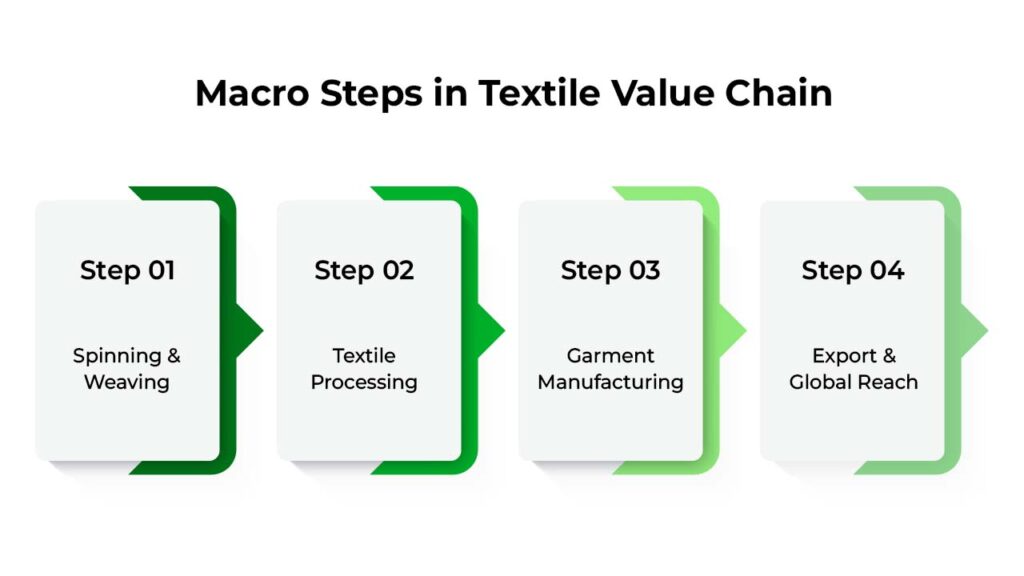The value chain’s ultimate stage, where materials are turned into finished goods ready for consumption, is marked by the garment manufacturing industry. Due to its trained labor force, cheap pricing, and adherence to rigorous delivery dates, Pakistan is becoming a top choice for international brands looking for high-quality and reasonably priced clothing.
The textile industry’s export-focused strategy has greatly boosted Pakistan’s international reach. Pakistani textiles are known for their high quality, dependability, and great variety, and they sold in marketplaces worldwide. This global presence has widened opportunities for economic development, increased foreign exchange earnings, and improved trade ties.
Cotton Cultivation
Cotton cultivation forms the foundation of the textile value chain in Pakistan. Particularly in Punjab and Sindh, the country’s favorable agroclimatic conditions make it an ideal location for cotton cultivation. Cotton cultivation has a long history in Pakistan, with small producers and large landowners actively engaged in the industry.
Pakistan has adopted modern farming methods, hybrid seeds, and genetically modified varieties to ensure a steady supply of high-quality cotton. These developments have substantially increased productivity and enhanced the overall quality of cotton grown. Farmers have access to agricultural knowledge and resources, allowing them to maximize their yields and satisfy the textile industry’s rising demand.
Cotton cultivation entails several steps, including land preparation, sowing, irrigation, pest control, and harvesting. Depending on their operations’ size, farmers employ traditional and mechanized techniques. Larger farms use mechanized equipment to improve their efficacy, whereas smaller farms rely on manual labor. The promotion of cotton cultivation relies heavily on government initiatives and support. Farmers receive subsidies on inputs such as seedlings, fertilizers, and pesticides, ensuring their affordability and accessibility. In addition, research and development efforts concentrate on creating disease-resistant and high-yielding cotton varieties, thereby enhancing productivity.
Cotton cultivation contributes to the textile industry’s raw material supply and employment opportunities, especially in rural areas. It is an indispensable source of income for smallholder farmers, allowing them to enhance their standard of living and contribute to the local economy.

Spinning and weaving
Spinning and weaving are essential in the Pakistani textile value chain, where cotton is transformed into fibers and fabric. These operations are carried out in spinning mills, and weaving facilities outfitted with cutting-edge machinery and technologies.
Spinning is the process of transforming unprocessed cotton fibers into yarn. The cotton fibers are cleaned, carded, drawn, and twisted to create a continuous yarn thread. Numerous large and minor spinning mills in Pakistan contribute to the country’s yarn production. These mills generate various yarn types, including combed cotton, carded cotton, and blended yarns, to meet the needs of the textile industry.
The yarn is then transported to weaving facilities and transformed into fabric. Weaving is systematically interlacing yarns to produce a fabric’s structure. Pakistan is renowned for its proficiency in producing various fabrics, from simple weaving to intricate patterns and designs. The weaving facilities utilize modern looms and technologies to produce fabric with precision and efficiency.
Pakistan’s spinning and weaving industry prioritizes quality control and innovation. Continuous research and development efforts aim to improve the textile and fabric’s durability, uniformity, and appearance. Adopting advanced spinning techniques, such as ring spinning and open-end spinning, has improved textile quality and productivity. Similarly, the weaving industry has incorporated technological advancements such as air-jet and rapier looms to increase fabric quality and production speed.
Textile processing
Textile processing plays a vital role in the value chain in Textile Industry of Pakistan, where the fabric undergoes various treatments and enhancements to satisfy market demands. This stage entails various processes, including bleaching, dying, printing, and finishing, all of which aim to improve the fabric’s aesthetics and functional properties.
Pakistani textile processing facilities are outfitted with cutting-edge machinery and technologies to carry out these processes effectively. These facilities adhere to international quality standards and implement eco-friendly practices, ensuring the sustainability of their production. Let’s examine some of the most important textile processing procedures:
- Bleaching: Bleaching is a procedure that removes impurities, stains, and the fabric’s natural color, leaving behind a white or light-colored base. It enhances the fabric’s absorption capacity and prepares it for further processing.
- Dyeing: Dyeing is the process of adding color to the fabric. The textile processing facilities of Pakistan excel in dyeing techniques and offer a vast array of color options and dyeing methods. These units use conventional and modern dyeing techniques, such as vat dyeing, reactive dyeing, and digital printing, to produce vibrant and long-lasting colors.
- Printing: Printing imbues the fabric with decorative patterns or designs. Pakistan is renowned for its textile printing expertise, offering a variety of printing techniques, including screen printing, rotary printing, and digital printing. Combining traditional craftsmanship with modern technology, the industry creates intricate and aesthetically pleasing designs.
- Finishing: Fabrics endure finishing procedures to improve their properties and functionality. These may include mercerization, which enhances the fabric’s sheen and tensile strength, or treatments for moisture-wicking, anti-static, or flame-retardant properties. Additionally, finishing processes ensure the fabric’s durability, suppleness, and shrinkage resistance.
The textile processing industry in Pakistan places a heavy emphasis on quality control and sustainability. The units promote responsible chemical management, water conservation, and energy efficiency and conform to international environmental standards. This commitment to eco-friendly practices has positioned Pakistan’s textile industry as the preferred option for brands and consumers who are environmentally conscious.
